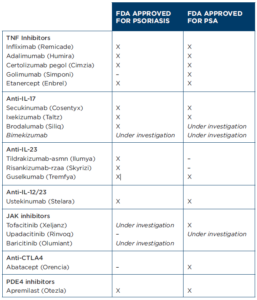“There is a still a role for methotrexate in the management of psoriasis, but it is getting smaller,” says Dr. Evans. “Methotrexate can still be used as an inexpensive first-line agent in certain situations. It is also often used as an adjunct agent to biologics to improve efficacy and possibly inhibit anti-drug antibodies. My perception is that dermatologists use it less often than other specialists, and that use continues to decrease as more biologic and oral options become available.”
In terms of when he reaches for a biologic to treat psoriasis, Dr. Evans says, “Biologics are commonly firstline agents in the modern treatment of psoriasis, especially severe psoriasis that either covers a large body surface area, or affects sensitive sites like the hands, feet, genitals or scalp. They can also be added when topicals, ultraviolet B, and oral agents have failed. It is generally more based on patient specific factors than an inflexible algorithm.”
As in PsA, there is no clear firstline biologic choice for the management of psoriasis. When he selects a therapy, Dr. Evans shares, “It is certainly patient specific, and most of the currently available biologics have a place in first-line treatment. Many dermatologists base their first decision point on whether the patient has psoriatic arthritis, in which case a TNF inhibitor or IL-17 inhibitor may be the first choice. Similarly, patient risk tolerance, comorbidities and payer factors may also influence the choice.”
Do TNF Inhibitors Still Play a Role?
With a veritable explosion of psoriasis and PsA bDMARDs within the past few years, clinical practice guidelines are struggling to keep up. Fortunately, network meta-analyses are providing some insight into comparative drug efficacy, and head-to-head randomized controlled trials are emerging and will inform future
practice guidelines.
The Cochrane Database of Systematic Reviews is conducting a living network meta-analysis of systemic pharmacological treatments for chronic plaque psoriasis, last updated in April 2021.6 The study includes 158 randomized controlled trials of systemic treatments in adults with moderate to severe plaque psoriasis or psoriatic arthritis with concomitant moderate to severe plaque psoriasis. The primary outcome was clear or almost clear skin—specifically, a Psoriasis Area and Severity Index (PASI) 90 at induction phase.
Interestingly, the authors concluded that compared with placebo, anti-IL-17 and anti-IL-23 inhibitors were the most effective induction treatments for clearing skin; infliximab was also very effective, whereas other TNF inhibitors were notably less so. Because the review was limited to induction therapy, the authors were unable to evaluate longerterm outcomes.




